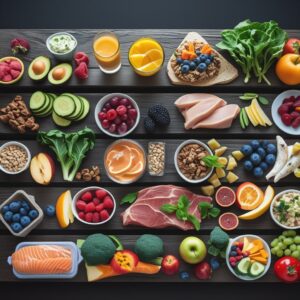Are you pushing yourself to the limit, striving for peak performance, but feeling like your energy is lagging?
You’ve probably tried countless supplements and training regimes – focusing on intense workouts and cutting-edge techniques. But often, the biggest factor remains overlooked: what you’re putting your body.
Nutrition isn’t just fuel; it’s the foundation of athletic success.
Imagine consistently delivering your best performance, pushing past fatigue, and recovering faster than ever before. This blueprint will give you that edge.
Let’s dive into the core principles – the secrets to optimizing your diet for maximum power and results.
Optimizing Athletic Nutrition Basics
It’s easy to get lost in complicated supplement regimes and confusing advice when it comes to fueling athletic performance.
That expensive protein powder or trendy electrolyte drink might seem like a game-changer, but often, the foundation of peak performance is surprisingly simple.
While you’re spending a fortune on fancy ingredients, elite athletes are built on a bedrock of consistent, foundational nutrition.
The key isn’t about chasing the latest trend; it’s about understanding how your body truly needs to operate for optimal energy and recovery.
Every dollar spent on unnecessary additives is an opportunity missed to prioritize whole foods that deliver sustained power.
But here’s what most nutrition experts won’t tell you: the biggest impact isn’t about complex formulas, it’s about mastering the basics – fueling your body with quality carbs, protein, and healthy fats at the right times.
Let’s break down exactly how to build an athletic dietary blueprint that works for .
Macronutrient Ratios for Gains
When optimizing your diet for peak athletic performance, understanding macronutrient ratios is key. It’s not just about calories; it’s about fueling your body effectively for training and recovery.
Let’s talk about protein – this is essential for muscle repair and growth. For most athletes, a ratio of around 1.6 to 2.2 grams of protein per kilogram of body weight daily is a solid starting point. You’ll want to focus on lean sources like chicken, fish, or plant-based options.
Think about it: after an intense workout, your muscles are broken down. Protein helps rebuild them stronger and faster. Consistent protein intake throughout the day supports this process.
Next up is carbohydrates – these provide your body with readily available energy for training and replenishing glycogen stores. A ratio of 4 to 5 grams per kilogram of body weight daily often works well, particularly around workouts.
Complex carbs like brown rice or sweet potatoes are great choices because they release energy slowly, sustaining you during longer sessions. Timing your carb intake strategically – before and after training – can maximize performance and recovery.
So, essentially, a balanced approach— prioritizing protein for muscle repair alongside carbohydrates for sustained energy— is the foundation of any athlete’s dietary blueprint.
Timing Your Fuel Intake Strategically
Often, performance hinges on when your body receives fuel. Strategic timing can make a massive difference in how you feel during training or competition.
Think about what you’re eating *before* you start—this is crucial for sustained energy and focus.
A complex carbohydrate, like oatmeal or whole-wheat toast, provides a slow release of fuel to keep your blood sugar steady. This avoids the crashes that can derail your efforts. Aim for this 2-3 hours before intense activity.
During longer sessions – think endurance sports – you need easily digestible carbohydrates for quick energy.
Sports gels, chews, or diluted fruit juice are great options to top up your fuel stores during training or competition. These provide a rapid boost when you need it most.
So, carefully planning what you consume before, during, and after activity can dramatically improve your performance – fueling your body strategically is key!
Hydration’s Crucial Role in Performance
Through optimal hydration, your performance can truly flourish. Let’s explore why water is so absolutely crucial for athletes.
Water makes up a huge percentage – around 70% – of an athlete’s body mass. This means it plays a vital role in almost every bodily function that supports peak athletic ability.
Think about it: your muscles are largely composed of water, and when you’re exerting yourself, they need this fluid to contract efficiently. Proper hydration ensures those movements are smooth and powerful. Furthermore, water regulates body temperature through sweat – a critical process during intense activity. Dehydration significantly impairs this cooling mechanism, leading to overheating and decreased performance.
Beyond muscle function and thermoregulation, adequate hydration supports cognitive processes too. Concentration, reaction time, and strategic thinking all depend on optimal brain function, which is heavily influenced by fluid levels.
Even slight dehydration can noticeably impact these mental skills – making it harder to focus during training or competition. Maintaining consistent hydration helps ensure your mind is as sharp as your body is strong.
Micronutrients Beyond the Basics – Trace Minerals
Despite the importance of macronutrients like protein, carbs, and fats, trace minerals play a surprisingly crucial role in fueling peak athletic performance. You often hear about getting enough calories, but what about the tiny building blocks that actually *make* those calories work?
Think of micronutrients – vitamins and minerals – as essential components for every process within your body, from muscle contraction to energy production. And trace minerals are a particularly powerful subset of these nutrients.
For example, zinc is vital for immune function, which can be significantly impacted by intense training. Similarly, magnesium supports muscle relaxation and nerve transmission – key factors in preventing cramps and optimizing recovery. Selenium acts as an antioxidant, protecting cells from damage caused by exercise-induced stress.
It’s easy to overlook these smaller amounts of minerals because they don’t create a dramatic immediate effect like a large dose of protein. But trace minerals are involved in countless biochemical reactions that directly influence your ability to train hard and recover quickly.
Essentially, you need to ensure you’re getting enough of these often-underestimated nutrients to truly unlock your athletic potential. It’s about building a holistic approach to fueling your body – not just focusing on the big numbers.
Personalized Fueling for Sport Types
You’ll find that fueling your performance is all about tailoring your nutrition to what you do. It’s not a one-size-fits-all situation, really.
Consider the demands of your sport when planning meals and snacks. A marathon runner needs significantly different fuel than a swimmer.
For endurance athletes like runners or cyclists, you need to focus on sustained energy— carbohydrates are key! These provide the fuel for long-duration efforts. Protein helps repair muscles after intense activity.
Conversely, power sports like weightlifting or sprinting require a different strategy. You’ll want to prioritize protein and creatine for muscle building and strength gains alongside adequate carbs for quick energy bursts.
So, understanding your sport’s specific needs— whether it’s sustained endurance or explosive power— is the first step toward optimizing your fueling plan.
Gut Health and Athlete Recovery
The athlete’s performance hinges on so much more than just training intensity. You see, gut health plays a surprisingly crucial role in recovery – and it’s something often overlooked.
A compromised digestive system can significantly slow down the repair process after intense physical exertion. Think of it like this: if your gut isn’t functioning optimally, nutrients aren’t being absorbed efficiently, meaning muscles don’t get what they need to rebuild and strengthen. Delayed recovery translates directly into reduced training capacity, increased risk of injury, and ultimately, a hampered performance trajectory. It’s not just about feeling tired; it’s about the body’s ability to actually *recover* from that fatigue.
Delayed recovery translates directly into reduced training capacity, increased risk of injury, and ultimately, a hampered performance trajectory. It’s not just about feeling tired; it’s about the body’s ability to actually *recover* from that fatigue.
Furthermore, gut bacteria – collectively known as the microbiome – are increasingly recognized for their influence on inflammation levels within the body. Intense training can temporarily elevate this inflammation, and a healthy microbiome helps to regulate it, promoting faster healing and reducing soreness.
Maintaining a diverse and thriving microbiome through diet (think plenty of fiber-rich foods!) is therefore key to optimizing athlete recovery – allowing you to bounce back stronger after every challenging workout.
The Science of Carb Loading – Advanced Techniques
What’s truly fascinating about carb loading is how it taps into your body’s energy stores. You see, carbohydrates aren’t just fuel; they’re your primary reserve.
Think of glycogen – that’s the stored form of carbohydrate in muscles and liver. It’s like a giant battery charging up for peak performance.
During intense activity, your body rapidly depletes this glycogen. Carb loading is all about maximizing those stores *before* an event.
Advanced techniques go beyond simply eating more pasta. You’re aiming to saturate your muscles with as much glycogen as possible – think of it like filling a tank to the brim.
This typically involves increasing carbohydrate intake significantly, often around 8-12 grams per kilogram of body weight daily, for the final 36-72 hours before competition. It’s about precision and timing.
The goal isn’t just to feel full; it’s to ensure your muscles have a readily available energy source when you need it most – during that crucial moment of exertion.
Supplement Strategies – Targeted Approaches
Now, let’s talk about boosting your performance through targeted supplementation. It’s not just about popping a pill; it’s about understanding exactly what your body needs at different stages of training and competition.
Think of supplements as fine-tuning – they amplify the benefits of good nutrition and consistent training. Focusing on specific areas is key.
For example, if you’re a sprinter needing explosive power, creatine can help increase energy availability for those short bursts. Or, if endurance is your focus, consider beta-alanine to buffer lactic acid buildup. It’s about addressing the specific demands of your sport.
Recovery also needs targeted support. You can use supplements like magnesium or tart cherry juice to reduce muscle soreness and inflammation after intense workouts.
These help repair tissue, allowing you to bounce back faster and train harder next time. It’s not a one-size-fits-all approach – what works for one athlete might not work as well for another.
So, the secret is in recognizing your body’s unique needs and choosing supplements that directly support those areas— optimizing performance through targeted strategies.
Understanding Energy Systems – Deep Dive
While your body needs fuel for performance, it’s not just about eating *more*. It’s about understanding how that fuel actually works. You see, energy systems are like different engines – each designed for a specific type of task and speed.
Let’s start with the basics: there are primarily three main energy systems your body uses during activity. They aren’t separate; they work together, but one often dominates depending on the intensity and duration of what you’re doing.
Firstly, you have the *ATP-PC system*. This is your immediate burst of power – think sprinting a short distance or lifting a heavy weight. It’s incredibly fast, but it uses up its fuel very quickly.Secondly, there’s the *glycolytic system*. This kicks in when you need more sustained energy and it doesn’t rely on oxygen. You might use this during a high-intensity run or a tough workout. However, this process creates byproducts that can cause fatigue.
Finally, you have the *aerobic system*, which is your long-distance powerhouse. It uses oxygen to generate energy from carbohydrates and fats – it’s much more efficient in the long run
Understanding these systems allows you to fuel yourself appropriately. If you’re going for a marathon, you need to focus on carbohydrate loading and maintaining steady energy levels through aerobic metabolism. But if you’re doing a quick sprint, you want to maximize your ATP-PC system with strategic fueling.
Avoiding Performance-Killing Dietary Pitfalls
Remember, fueling your body properly is absolutely critical for peak athletic performance.
This is because many dietary choices can actually sabotage your training efforts – hindering progress and causing frustrating setbacks.
Think about it: consuming excessive amounts of sugary foods or drinks provides a quick energy boost, followed by a massive crash that leaves you feeling sluggish and depleted. Similarly, neglecting proper hydration leads to muscle cramps and impaired cognitive function. These seemingly small dietary choices can significantly impact your ability to train effectively.
To avoid these performance-killing pitfalls, focus on building a nutrition plan centered around whole foods and strategic timing.
Prioritize lean protein sources for muscle repair and growth, complex carbohydrates for sustained energy, and healthy fats for hormone regulation and overall well-being. Timing your meals and snacks around workouts is also key – fueling up before training and replenishing glycogen stores afterward.
The key to unlocking your athletic potential lies in making smart dietary choices that support your goals. By carefully managing what you consume, you can maximize your energy levels, accelerate recovery, and ultimately achieve peak performance.
Adapting Your Fuel for Intense Training
With intense training comes a need for fuel that truly supports your efforts. It’s not just about shoving any food down— it’s about strategically adapting what you consume to maximize performance and recovery.
Think about timing— fueling up before, during, and after workouts is key. Before, focus on complex carbohydrates for sustained energy.
This could be oatmeal with fruit or whole-wheat toast with avocado. During longer sessions, easily digestible carbs like gels or sports drinks provide a quick boost. And after? Replenish glycogen stores with protein and fast-acting carbs.
Hydration is absolutely critical— don’t underestimate its role! Dehydration drastically impacts performance and recovery.
You need to constantly hydrate throughout the day, especially around training sessions. Electrolytes are also important – they help maintain fluid balance and support muscle function.
So adapting your fuel— focusing on timing, carb sources, protein intake, and hydration— is what will really elevate your performance during intense training.
Monitoring & Refining Your Dietary Blueprint
It’s like understanding your body is a high-performance machine – you wouldn’t just fill it with any fuel, would you? Similarly, optimizing your diet for peak athletic performance requires constant attention and adjustment.
The key here is detailed tracking— recording everything you consume, not just to count calories, but to truly understand the impact on your energy levels and recovery.
Start by logging every meal and snack, noting down portion sizes precisely. Then, pay close attention to how you feel after each one – do you experience a surge of energy followed by a crash? Or perhaps sluggishness? This feedback is invaluable.
Refining your blueprint involves analyzing this data— looking for patterns between what you eat and how you perform.
Perhaps you notice that consuming excessive amounts of simple carbohydrates before a workout leads to an unsustainable energy spike, followed by a significant dip. Or maybe certain foods consistently cause digestive discomfort. This awareness allows you to make targeted adjustments.
So, monitoring and refining your dietary blueprint isn’t about rigid rules; it’s about using data-driven insights to fine-tune what works best for *you* – maximizing your potential with every bite.
Unlock Peak Potential: Fueling Your Body for Extraordinary Results…Seriously!
Optimal performance hinges on what fuels it, and frankly, haphazard eating just isn’t going to cut it when striving for greatness.
The body demands consistent nourishment tailored specifically to the rigors of athletic training. A diet lacking vital nutrients—adequate protein, complex carbohydrates, healthy fats, and crucial electrolytes—will inevitably limit energy levels, slow recovery times, and ultimately hinder progress toward ambitious goals. It’s about recognizing that food isn’t just fuel; it’s the building blocks for sustained power and resilience.
Prioritizing a strategic dietary approach demonstrably enhances strength, speed, endurance, and overall athletic capacity. Consistent fueling supports muscle repair, reduces inflammation, and optimizes cognitive function – all critical components of peak performance. Ignoring this foundational element is essentially handicapping oneself before the competition even begins.
Invest in your body’s potential today by implementing a dietary blueprint designed for athletic success. Start small, focus on whole foods, and witness the transformative impact of optimized nutrition as it elevates every training session and propels achievements forward.




